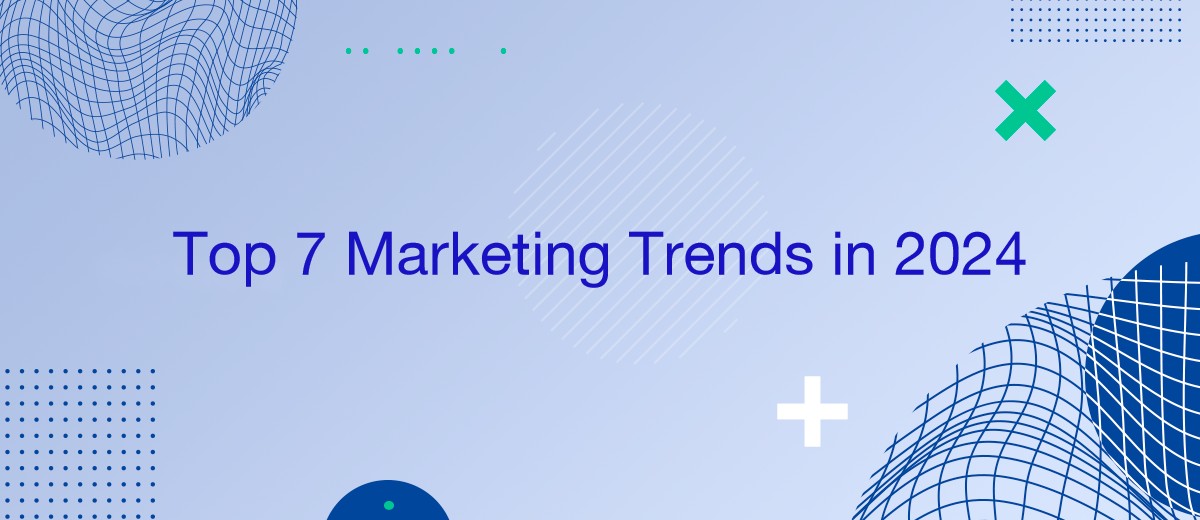Marketing is a very dynamic environment, influenced by many factors. It is most significantly affected by new technologies, consumer tastes and behaviors, and regulatory restrictions. Therefore, marketers should pay attention not only to summing up the results but also to forecasting future marketing trends. If you didn’t have time or forgot to do this, our article will help you fill this gap. Here are 7 trends that will be relevant for digital marketing throughout 2024.
AI Technologies and Conversational Marketing
Technological innovations and changing consumer behavior, under their influence, are already dictating marketing trends in 2024. Artificial intelligence promises to be one of the brightest among them. The biggest impact of AI will be in content marketing, making it more personalized and effective. Software tools based on neural networks will finally change the principles of business interaction with its audience.
Currently, AI technologies are taking conversational marketing to a new level, closely related to digital marketing automation software. With the help of smart chatbots and virtual assistants, companies can be in touch with customers online 24/7. They instantly provide them with the support they need without making them wait a minute. Artificial intelligence will ensure not only the efficiency of communication but also its personalization. Having access to data on customers' preferences, views, and purchases, it will analyze it at lightning speed and make relevant recommendations for each. All this will definitely improve the user experience and increase conversion.
Another important area of application of AI in marketing trends is predictive analytics. Advanced neural network algorithms quickly and efficiently process large volumes of data. Based on them, they generate useful insights and help make significant decisions in real-time. For example, the analysis of large sets of customer data allows us to identify certain patterns and trends in them. This information is necessary for targeting and organizing other marketing activities.
Hyper-personalization of Marketing

Digital marketing continues its journey toward personalization. It will take on even greater proportions as large amounts of data from various sources (online stores, social networks, and offline retail outlets) are constantly accumulating. This trend further highlights the importance of data-driven marketing and the fact that today's consumer expects highly personalized experiences. Therefore, businesses must adapt their marketing campaigns to new trends.
Maximum personalized marketing involves customizing content, product recommendations, and even advertising for each visitor. The development of this trend is closely related to the previous trend. The spread of AI algorithms, machine learning, and big data will make it more efficient and widespread. Marketing strategies that do not take this into account will become less effective and quickly lose their relevance. Finally, hyper-personalization of marketing will improve the customer experience. This will have a positive impact on their loyalty and conversion.
Advanced personalization will impact the user experience not only in the online world but also in the offline world. This makes it one of the global marketing trends for 2024. As the trend spreads, offline retailers and consultants will soon track customers' previous purchases and preferences. The goal is to provide personalized suggestions and recommendations.
Opting out of Third-party Cookies
Google planned to start blocking cookies from third-party sites in 2023, but postponed this innovation until next year due to the hype. In January 2024, the corporation launched testing of the new Tracking Protection feature in its Chrome Internet browser. It will counteract website tracking of visitors, by default limiting resource access to third-party cookies. As part of testing, Google added this feature to the browsers of 1% of users worldwide, randomly selecting them.
The introduction of Tracking Protection is one of the key stages of Google's Privacy Sandbox initiative. Its ultimate goal is to completely phase out support for third-party cookies in the second half of 2024. Introduced more than 30 years ago, cookies are an integral part of the modern Internet. Their visitor tracking and targeting capabilities are effective for a data driven marketing strategy. Google considers this technology outdated and non-confidential. It has created new web tools and is giving developers time to fully adopt them.
Blocking third-party cookies can be a significant issue for businesses. Particularly for those companies that rely on them to gather data on their audience's behavior and target advertising campaigns. Instead of this convenient all-in-one tool, they will have to use browser APIs and information from other sources. Advertisers will rely more on website or app content to determine consumer interests and preferences, rather than browser-based data. Google's Privacy Sandbox initiative should provide new targeting technologies. They will track users' actions individually, without risking their privacy.
Self-service Advertising Platforms
In 2024, the popularity of self-service advertising platforms will steadily increase. Their spread is due to tightening standards for the protection of personal data and the desire of businesses to escape the control of Big Tech corporations. Such services provide brands with tools to launch and manage online advertising campaigns directly, bypassing large intermediary platforms. Among the most famous of them, it is worth noting:
- The Trade Desk. Its users can purchase digital advertising inventory through the provided programmatic channels. They will no longer have to rely on Google and Meta tools. This principle provides greater transparency and control over advertising.
- Adform. Offers the ability to self-serve advertising campaigns in different formats: video advertising, for mobile devices, social networks, and so on. Has advanced digital marketing automation tools and AI support.
- MediaMath. The independent platform helps advertisers set their bids and buy ads in real time. It allows you to make settings based on campaign goals and user data.
Self-service platforms are well deserving of becoming one of the top digital marketing trends in 2024. They hand over control of online advertising to direct advertisers, giving them autonomy and flexibility in developing advertising strategies. Using these platforms, brands can dynamically customize their campaigns based on up-to-date data, increasing their effectiveness and reducing costs. Another current trend in online marketing will help optimize their performance is AI technologies, based on which these systems are developed.


Self-service platforms support more ad formats and media publishers. This helps advertisers effectively diversify their spending. Such services are the best option for entrepreneurs and marketers who want to get the most out of a limited budget.
E-commerce and Retail Media
The rise in popularity of self-service advertising platforms is expected to be coupled with an increase in e-commerce and retail media. This category includes digital advertising placed in online stores, marketplaces, and other online trading platforms. According to experts, this area, included in the top marketing trends, will significantly affect digital marketing in 2024. It will change the way brands interact with consumers and integrate advertising into retail.
Today, several large platforms offer such services:
- Amazon DSP. With it, brands can plan, launch, measure, and optimize advertising campaigns on Amazon properties, as well as on third-party sites and applications.
- Walmart Connect. Allows brands to promote their products and services not only on Walmart’s online resources but also to redirect the audience from there to external sites and social networks.
E-commerce and retail media closely integrate marketing tools into the shopping process on their platforms. As a result, customers receive useful, personalized recommendations and relevant advertising. In addition, retailers have large amounts of data on transactions and visitor behavior. By taking advantage of their capabilities, brands can use this information to more accurately target and increase the efficacy of their campaigns.
Data Privacy
Google's refusal to support third-party cookies is one of the digital marketing trends aimed at implementing stricter measures to protect personal data. According to experts, the marketing landscape will undergo significant changes in terms of increased confidentiality of primary consumer data. This will compel marketers to seek new channels for gathering audience information, primarily relying on their own sources. Browsers will no longer provide data to advertisers, thus necessitating more direct engagement with customers.
On the other hand, such a situation can motivate businesses to explore new promising solutions. Companies have long desired to liberate themselves from the constraints imposed by Google, Meta, or other similar service providers. Now, the giants themselves are encouraging them to set out on a free floating.
Many advertisers have already started actively testing contextual and third-party solutions for collecting and processing user data without retargeting. The main challenges for marketers in the context of these top marketing trends for 2024 will involve utilizing primary consumer data while upholding strict privacy standards. Personalized content, loyalty programs, and direct communication through social networks can prove highly effective in this regard.
Interactivity and VR/AR Technologies
Interactivity in marketing is an indicator of how actively a user interacts with a brand and its products. One of the most popular interactive formats today is gamification. The most striking example of gamification in marketing is loyalty programs. They allow consumers to earn points for their purchases or other activities, and then redeem them for discounts or other benefits.
Interactivity has been included in the top digital marketing trends for several years now. However, the spread of VR and AR technologies can take it to a fundamentally new level. The boundary between the digital space and the surrounding reality is becoming more and more blurred every year. Virtual (VR) and augmented reality (AR) technologies play a key role in this. Thanks to them, marketers can provide audiences with the most vivid and immersive experiences of a brand and its products.
Interactivity based on virtual/augmented reality is considered one of the top trends in digital marketing in 2024. Already, now these technologies have the broadest potential for application. For example, they can be used to create AR tours to visualize interior design or home furniture. VR presentations of new car market products look no less impressive. Given the constant improvement of VR/AR technologies and their adaptation for the mass user, businesses will increasingly use them in marketing.
Conclusion
2024 promises to be rich in new trends in marketing, so in our review, we only talked about the most important ones. One of the most promising trends is the massive use of AI technologies and digital marketing automation. Marketing campaigns will become even more personalized. Increased privacy protections and the elimination of third-party cookies will force advertisers to look for other ways to collect data.
Among other current marketing trends in 2024, the proliferation of self-service advertising platforms is expected, which will help businesses escape the restrictions of tech giants. The key areas of marketing will be e-commerce and retail media with their ability to place advertisements on large trading platforms. Finally, it is worth noting the importance of interactive marketing tools. Their efficiency will increase due to integration with VR/AR technologies.
What do you do with the data you get from Facebook lead forms? Do you send them to the manager, add them to mailing services, transfer them to the CRM system, use them to implement feedback? Automate all of these processes with the SaveMyLeads online connector. Create integrations so that new Facebook leads are automatically transferred to instant messengers, mailing services, task managers and other tools. Save yourself and your company's employees from routine work.
